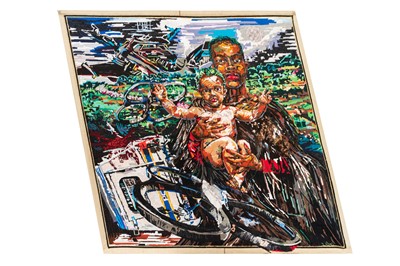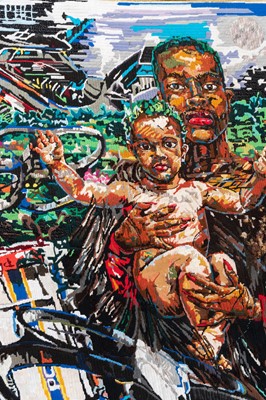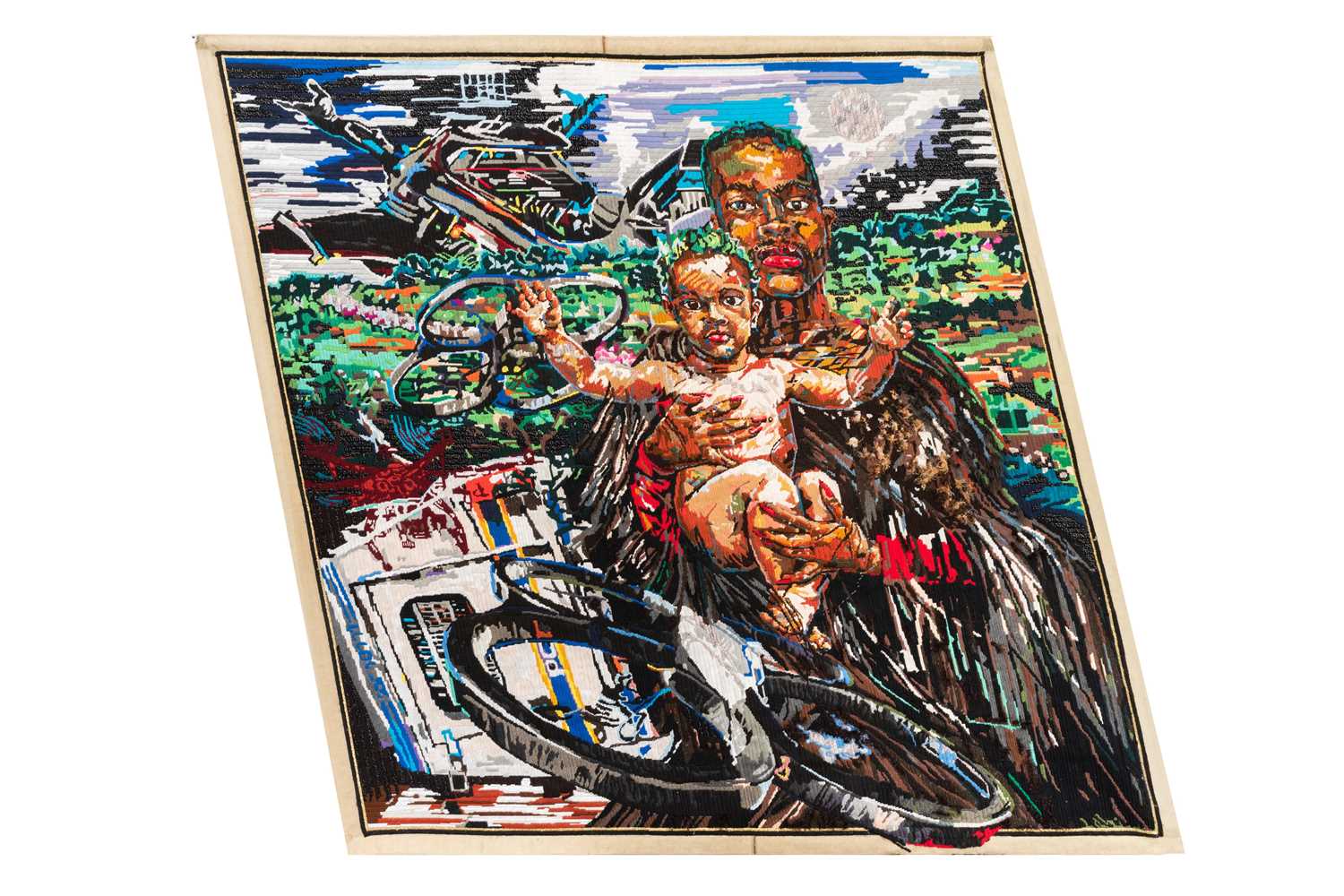22nd Jun, 2022 18:00
The Present Future: A Private Collection of African & International Contemporary Art (Live Auction)
28
Athi-Patra Ruga (South Africa 1984-)
Imini Yomjojo (Judgement Day)
wool and thread on tapestry canvas
Artwork date: 2016
Exhibited: WHATIFTHEWORLD Gallery, Cape Town, 'Athi-Patra Ruga: Queens in Exile 2014-2017', 29 November 2017 to 7 February 2018.
Sold for R569,000
Estimated at R500,000 - R700,000
wool and thread on tapestry canvas
Artwork date: 2016
Exhibited: WHATIFTHEWORLD Gallery, Cape Town, 'Athi-Patra Ruga: Queens in Exile 2014-2017', 29 November 2017 to 7 February 2018.
(1)
197 x 191 cm
Provenance:
Private collection, Cape Town.
WHATIFTHEWORLD Gallery, Cape Town.
Notes:
In the 1990s, buoyed by a radical constitution engineered by Justice Albie Sachs, MCQP – The Mother City Queer Project – came into being. Its manifesto defined what today we regard as gender fluidity. “Although many Queer people are homosexual, not all homosexuals are Queer. Not all heterosexuals un-Queer. In fact, some straight people are Queerer than some gay people. Queerness is not a cut-and-dried definition … Queerness is an attitude.”[1]
A generation later, Athi-Patra Ruga would arrive on the South African, now global, art scene, bearing a name that evoked Asian mysticism and African mischief. Because what can never be ignored when looking at a Ruga work, is its playfulness, its irresistible drive to spoof convention, revoke authority, skew what we think of as commonplace or normative. He is Shakespeare’s archetypal court jester, the trickster who speaks truth to power.
In this noisily opinionated and divisive Woke Era, Ruga invokes the genuine and complex radicalism championed by MCQP – which compels us to rethink binaries and grasp the rich complexity of queerness. As gender theorist Judith Butler reminds us, as an attitude queerness must be twisted, and further queered if it is to grasp its ‘expanding purposes’. Because Queerness – undomesticated – is the sum of “democratising contestations that have and will redraw the contours of the movement in ways that can never be fully anticipated in advance”.[2]
Herein lies Ruga’s wit and genius. As an artist he does not carve out a territory but expands it. The current two works (lots 24 & 25) examine religious (Christian) hagiography – the archetypal Mother and Child, with the artist standing in as the mother, in Imini Yomjojo (Judgement Day) (lot 24). Why not? If queerness is an attitude, isn’t this precisely Ruga’s whimsical yet deeply earnest strategy? Welded discs, like multiplied cold steel halos, twinned handcuffs, hurtle forwards and backward, a cop car is overturned. A tempest meets beatific composure, the whole a jarring yet gentle meld. The child the artist holds before us is the iconic figure of transcendence, the rest is chaos.
Invitation….Presentation….Induction (lot 25), the second tapestry – a material used by the Medieval Church to tell stories for the illiterate majority – focuses on early black resistance to colonization. The gay Dingaan’s gleaming rippling warriors hurl spears and hold up shields against a perplexing enemy – Ruga’s iconic vision of a Koonsian Camp Glam, a figure whose upper body and face is obscured by balloons, while the elongated sheer legs are capped with bling high heels.
We all know writer and cultural philosopher Susan Sontag’s famous definition of Camp taste – it “turns its back on the good-bad axis of ordinary aesthetic judgement. It doesn’t argue that the good is bad, or the bad is good” – precisely.[3] This is the point of all that Athi-Patra Ruga makes and does. His art embodies health in this dark age of bigotry.
Ashraf Jamal
[1] Jamal, A. (2005). Predicaments of Culture in South Africa. Pretoria and Lieden: UNISA and Koninklijke Brill NV.p.104.
[2] Butler, J. (2000). Critically Queer. In Goodman, L & de Gay, J (Eds.) as cited in Jamal, A. (2005). Predicaments of Culture in South Africa. Pretoria and Lieden: UNISA and Koninklijke Brill NV. p.105.
[3] Sontag, S. (1964). Notes on Camp. p.9. Retrieved from https://monoskop.org/images/5/59/Sontag_Susan_1964_Notes_on_Camp.pdf
You can place an absentee bid through our website - please sign in to your account on our website to proceed.
In the My Account tab you can also enter telephone bids, or email bids@aspireart.net to log telephone/absentee bids.
Join us on the day of the auction to follow and bid in real-time.
The auction will be live-streamed with an audio-visual feed.
Auction: The Present Future: A Private Collection of African & International Contemporary Art (Live Auction), 22nd Jun, 2022
IMPORTANT NOTICE:
Logistics
While we endeavour to assist our Clients as much as possible, we require artwork(s) to be delivered and/or collected from our premises by the Client. In instances where a Client is unable to deliver or collect artwork(s), Aspire staff is available to assist in this process by outsourcing the services to one of our preferred Service Providers. The cost for this will be for the Client’s account, with an additional Handling Fee of 15% charged on top of the Service Provider’s invoice.
Aspire Art provides inter-company transfer services for its Clients between Johannesburg and Cape Town branches. These are based on the size of the artwork(s), and charged as follows:
Small (≤60x90x10 cm): R480
Medium (≤90x120x15 cm): R960
Large (≤120x150x20 cm): R1,440
Over-size: Special quote
Should artwork(s) be collected or delivered to/from Clients by Aspire Art directly, the following charges will apply:
Collection/delivery ≤20km: R400
Collection/delivery 20km>R800≤50km
Collection/delivery >50km: Special quote
Packaging
A flat fee of R100 will be added to the invoice for packaging of unframed works on paper.
International Collectors Shipping Package
For collectors based outside South Africa who purchase regularly from Aspire Art’s auctions in South Africa, it does not make sense to ship artworks individually or per auction and pay shipping every time you buy another work. Consequently, we have developed a special collectors’ shipping package to assist in reducing shipping costs and the constant demands of logistics arrangements.
For buyers from outside South Africa, we will keep the artworks you have purchased in storage during the year and then ship all the works you have acquired during the year together, so the shipping costs are reduced. At the end of the annual period, we will source various quotes to get you the best price, and ship all your artworks to your desired address at once.
Aspire Art will arrange suitable storage during, and cost-effective shipping at the end, of the annual period.
Collections
Collections are by appointment, with 24-hours’ notice
Clients are requested to contact the relevant office and inform Aspire Art of which artwork(s) they would like to collect, and allow a 24-hour window for Aspire Art’s logistics department to retrieve the artwork(s) and prepare them for collection.
Handling Fee
Aspire Art charges a 15% Handling Fee on all Logistics, Framing, Restoration and Conservation arranged by Aspire.


